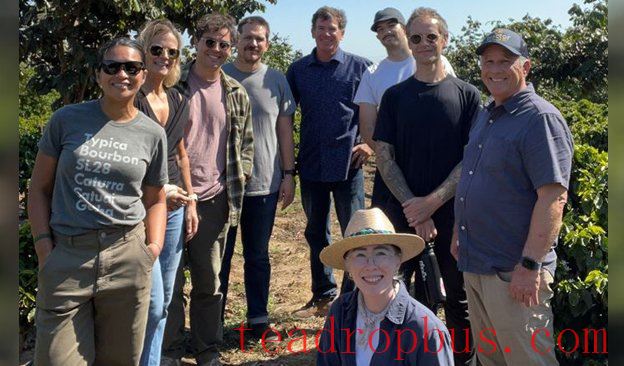
A new chapter is being written in American coffee culture as Blue Bottle partners with more California coffee producers like Hobson Farms. Photo credit: Hobson Family Farms
California has long been renowned for its vibrant café scene, from the third-wave coffee movement pioneers in San Francisco to the trendsetting specialty shops of Los Angeles. Yet the idea of California-grown coffee has, until recently, seemed as foreign as snow on its sun-drenched beaches. This perception is rapidly changing as Southern California emerges as a promising coffee-growing region in America, earning it the moniker "The Napa of Coffee" among industry insiders.
Historically, coffee has never grown this far from the equator. However, Southern California's unique microclimate creates conditions that are remarkably similar to those found in some of the premium coffee-growing regions worldwide. This is not just a novelty, it's transformative for American coffee culture which, until now, had to rely on Hawaii and Puerto Rico for domestic production.
America’s First Gesha: The Crown Jewel of Hobson Farms
At the vanguard of this agricultural revolution stands Hobson Farms, which recently made history by successfully producing America's first Gesha coffee, a variety renowned globally for its complex floral notes and commanding premium prices at auction. Located in the coastal foothills of San Diego County, Hobson Farms has partnered with industry titan Blue Bottle Coffee for post-harvest cupping, bringing expert validation to their groundbreaking endeavor. The Gesha had tasting notes of pixie tangerine, orange blossom, and brown sugar, with a lingering, syrupy sweetness.
“We sold out our first lot in less than one business day! Maybe we are not crazy to think that California coffee has a future,” says Dave Armstrong, CEO at Hobson Family Farms.
Hobson Family Farms is the largest coffee farm in California. The region of the farm holds a rich tradition of citrus and avocado farming. The land is particularly fertile, which was evident in the richness of the cup, which is a classic tangerine-forward expression of the Gesha vertical.
FRINJ Coffee: Pioneering California’s Coffee Identity
Behind much of the region's coffee development is FRINJ Coffee, a company founded by Jay Ruskey, who planted his first experimental coffee trees alongside avocados in 2002. What began as an agricultural curiosity has evolved into a network of over 70 farms across Southern California, creating both a production infrastructure and regional identity for California coffee.
Ruskey has experience in cultivating rare tropical fruits and working on research plant trials with the University of California Cooperative Extension and the California Rare Fruit Growers. His knowledge and experience helped him to develop coffee plants that not only survive but also thrive in the Southern Californian climate.
FRINJ evolved from a unique working relationship between Jay and Mark Gaskell, PhD, a California Cooperative Extension Farm Advisor. Price Peterson of Hacienda Esmerelda, Willem Boot of Boot Coffee, and Dan Cox of Coffee Enterprises were some of the many people who mentored Ruskey and the FRINJ team, helping them to learn and thrive in the coffee arena. Today, FRINJ is building California’s coffee industry through careful observation of cultivars, plant selection, and traditional breeding of coffee plants.
Blue Bottle’s California Showcase
In perhaps the most significant market validation yet, legendary specialty coffee retailer Blue Bottle has released its "Exceedingly Rare California Frinj Naturals", a limited offering featuring a blend of Caturra and Catuai varieties grown in Santa Barbara and Ventura counties.
This release represents more than a novelty product; it signals the specialty coffee industry's recognition of California's potential as a serious origin. Processed using the natural method that emphasizes the coffee's inherent sweetness, these beans offer consumers a taste profile described as "intensely aromatic with notes of ripe strawberry, orange blossom, and brown sugar."
Environmental Advantages in the Golden State
What makes Southern California particularly suitable for premium coffee production extends beyond its Mediterranean-like climate. The region's advanced water management practices, abundant sunshine, and absence of certain coffee pests have created unexpected advantages.
Furthermore, California's aggressive environmental regulations mean coffee grown here adheres to some of the world's strictest standards regarding pesticide use and worker protection, factors increasingly important to conscious consumers.
From Niche to Notable: The Future of Californian Coffee
While still representing just a tiny fraction of global coffee production, California-grown coffee has enormous potential to reshape America's relationship with its favorite beverage. With retail prices ranging from $75 to over $100 per pound, these coffees occupy an ultra-premium niche similar to fine wines.
This makes it quite apt to call the region the ‘Napa Valley of Coffee’. Like California wines in the 70s, these coffees are challenging perceptions about where quality can originate. Additionally, just as Napa learned from European traditions while developing its own identity, California coffee is creating something both informed by coffee’s rich heritage and distinctly its own.
As climate change threatens traditional growing regions across the coffee belt, Southern California's entry into production also represents an important development in coffee's future resilience. These farms demonstrate viable coffee production models outside traditional equatorial zones, potentially securing the future of specialty coffee as global growing conditions continue to shift.
For coffee enthusiasts seeking America's most exciting new origin, the road now leads not only to Hawaii's established farms but to the coastal slopes of Southern California, where a new chapter in American coffee production is being written one exceptional bean at a time.